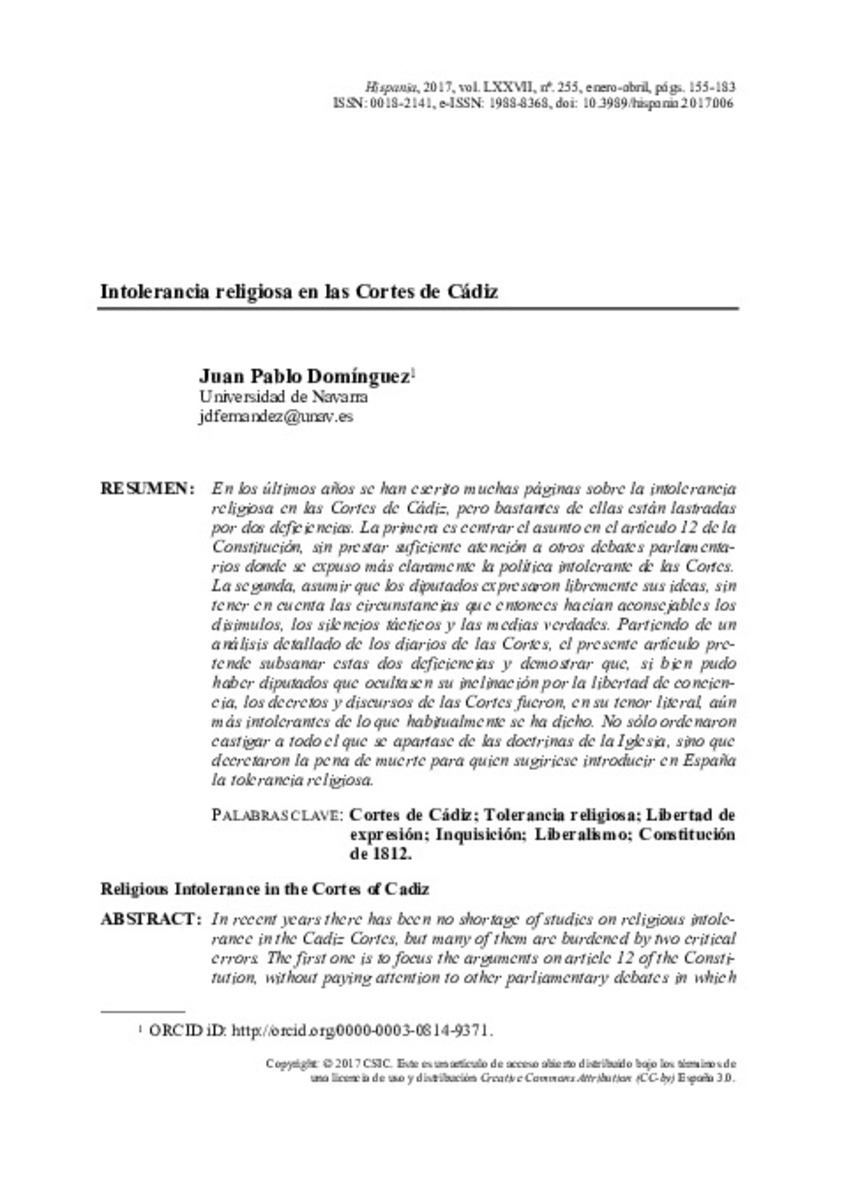Registro completo de metadatos
| Campo DC | Valor | Lengua/Idioma |
|---|---|---|
| dc.creator | Dominguez, J. P. (Juan Pablo) | - |
| dc.date.accessioned | 2017-06-07T10:50:37Z | - |
| dc.date.available | 2017-06-07T10:50:37Z | - |
| dc.date.issued | 2017 | - |
| dc.identifier.citation | Dominguez, J. P. (Juan Pablo). "Intolerancia religiosa en las Cortes de Cádiz". Hispania. 77 (255), 2017, 155 - 183 | es_ES |
| dc.identifier.issn | 0018-2141 | - |
| dc.identifier.uri | https://hdl.handle.net/10171/43569 | - |
| dc.description.abstract | En los últimos años se han escrito muchas páginas sobre la intolerancia religiosa en las Cortes de Cádiz, pero bastantes de ellas están lastradas por dos deficiencias. La primera es centrar el asunto en el artículo 12 de la Constitución, sin prestar suficiente atención a otros debates parlamentarios donde se expuso más claramente la política intolerante de las Cortes. La segunda, asumir que los diputados expresaron libremente sus ideas, sin tener en cuenta las circunstancias que entonces hacían aconsejables los disimulos, los silencios tácticos y las medias verdades. Partiendo de un análisis detallado de los diarios de las Cortes, el presente artículo pretende subsanar estas dos deficiencias y demostrar que, si bien pudo haber diputados que ocultasen su inclinación por la libertad de conciencia, los decretos y discursos de las Cortes fueron, en su tenor literal, aún más intolerantes de lo que habitualmente se ha dicho. No sólo ordenaron castigar a todo el que se apartase de las doctrinas de la Iglesia, sino que decretaron la pena de muerte para quien sugiriese introducir en España la tolerancia religiosa. | es_ES |
| dc.description.abstract | In recent years there has been no shortage of studies on religious intolerance in the Cadiz Cortes, but many of them are burdened by two critical errors. The first one is to focus the arguments on article 12 of the Constitution, without paying attention to other parliamentary debates in which the intolerant policy of the Cortes was more clearly expounded. The second common mistake is to ignore the circumstances which prevented some deputies from freely speaking their minds on religious matters. Through a detailed analysis of the proceedings of the Cortes, as well as other sources of the period, this article is intended to remedy both shortcomings, and thus to question certain common assumptions in current historiography. This approach leads to the conclusion that, while some deputies may had hidden his penchant for freedom of conscience, the decrees and speeches of the Cortes were more intolerant than many suppose. Not only they ordered to punish all dissenters from the Church's doctrines, but they decreed death penalty for anyone who dared to suggest the introduction of religious freedom in Spain. | es_ES |
| dc.language.iso | spa | es_ES |
| dc.publisher | Consejo Superior de Investigaciones Científicas | es_ES |
| dc.rights | info:eu-repo/semantics/openAccess | es_ES |
| dc.subject | Materias Investigacion::Ciencias Sociales | es_ES |
| dc.subject | Cortes de Cádiz | es_ES |
| dc.subject | Tolerancia religiosa | es_ES |
| dc.subject | Libertad de expresión | es_ES |
| dc.subject | Inquisición | es_ES |
| dc.subject | Liberalismo | es_ES |
| dc.subject | Constitución de 1812 | es_ES |
| dc.title | Intolerancia religiosa en las Cortes de Cádiz | es_ES |
| dc.title.alternative | Religious Intolerance in the Cortes of Cadiz | es_ES |
| dc.type | info:eu-repo/semantics/article | es_ES |
| dc.description.note | Este obra está bajo una licencia Creative Commons Reconocimiento 3.0 España (CC-by) | es_ES |
| dc.identifier.doi | http://dx.doi.org/10.3989/hispania.2017.006 | es_ES |
| dadun.citation.endingPage | 183 | es_ES |
| dadun.citation.number | 255 | es_ES |
| dadun.citation.publicationName | Hispania | es_ES |
| dadun.citation.startingPage | 155 | es_ES |
| dadun.citation.volume | 77 | es_ES |
Ficheros en este ítem:
Estadísticas e impacto
Los ítems de Dadun están protegidos por copyright, con todos los derechos reservados, a menos que se indique lo contrario.






